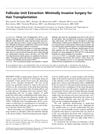 153 citations,
August 2002 in “Dermatologic Surgery”
153 citations,
August 2002 in “Dermatologic Surgery” Follicular Unit Extraction (FUE) is a less invasive hair transplant method with minimal scarring, suitable for about 60% of patients, especially those needing fewer grafts and quicker recovery.
 77 citations,
April 1999 in “Dermatologic Clinics”
77 citations,
April 1999 in “Dermatologic Clinics” The document concludes that follicular unit transplantation offers more natural results and better graft survival than older hair transplant methods.
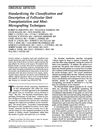 33 citations,
September 1998 in “Dermatologic Surgery”
33 citations,
September 1998 in “Dermatologic Surgery” Surgeons suggested a standard system for hair transplant methods to improve communication and results.
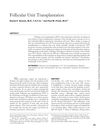 28 citations,
November 2008 in “Facial Plastic Surgery”
28 citations,
November 2008 in “Facial Plastic Surgery” Follicular Unit Transplantation (FUT) can give great results and patient satisfaction when done carefully and by a skilled surgeon.
 18 citations,
December 2014 in “Plastic surgery”
18 citations,
December 2014 in “Plastic surgery” Follicular Unit Transplantation is an effective and safe treatment for hair loss due to scarring.
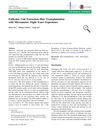 17 citations,
May 2015 in “Aesthetic Plastic Surgery”
17 citations,
May 2015 in “Aesthetic Plastic Surgery” FUE hair transplantation using a micromotor is effective and gives natural results with few complications.
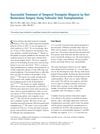 16 citations,
June 2009 in “Dermatologic Surgery”
16 citations,
June 2009 in “Dermatologic Surgery” A 17-year-old boy with Temporal Triangular Alopecia successfully grew new hair after a hair restoration surgery using follicular unit transplantation.
 15 citations,
June 2006 in “Journal of Plastic Reconstructive and Aesthetic Surgery”
15 citations,
June 2006 in “Journal of Plastic Reconstructive and Aesthetic Surgery” FUT effectively treats male-pattern hair loss with high satisfaction.
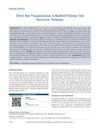 15 citations,
January 2013 in “Journal of Cutaneous and Aesthetic Surgery”
15 citations,
January 2013 in “Journal of Cutaneous and Aesthetic Surgery” The modified Direct Hair Transplantation method is effective for treating baldness with better graft survival and less damage than standard techniques.
 11 citations,
July 2010 in “Dermatologic Surgery”
11 citations,
July 2010 in “Dermatologic Surgery” Postoperative folliculitis after hair transplants is a minor issue that doesn't relate to patient details or how much hair is transplanted.
 10 citations,
August 2015 in “Journal of Cosmetic Dermatology”
10 citations,
August 2015 in “Journal of Cosmetic Dermatology” Successful eyebrow restoration can be done using careful hair transplant techniques and choosing the right patients.
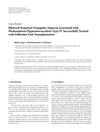 10 citations,
January 2011 in “Case reports in dermatological medicine”
10 citations,
January 2011 in “Case reports in dermatological medicine” Hair transplant surgery effectively treated a specific type of hair loss and is recommended as a primary treatment option.
 9 citations,
March 2020 in “Dermatologic Surgery”
9 citations,
March 2020 in “Dermatologic Surgery” Both Follicular Unit Transplantation (FUT) and Follicular Unit Excision (FUE) are effective hair transplant methods; the best choice depends on the patient's needs and the surgeon's preference.
 8 citations,
April 2020 in “Facial Plastic Surgery Clinics of North America”
8 citations,
April 2020 in “Facial Plastic Surgery Clinics of North America” Follicular Unit Transplantation is a reliable hair restoration method with a high success rate and minimal scarring.
 8 citations,
February 2016 in “The American Journal of Dermatopathology”
8 citations,
February 2016 in “The American Journal of Dermatopathology” Hair transplants can make hair follicles larger and hair shafts thicker.
 4 citations,
January 2005 in “Elsevier eBooks”
4 citations,
January 2005 in “Elsevier eBooks” Follicular Unit Transplantation is a precise hair restoration technique that requires careful planning and a skilled team, and Follicular Unit Extraction offers a less invasive option.
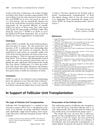 4 citations,
February 2000 in “Dermatologic Surgery”
4 citations,
February 2000 in “Dermatologic Surgery” The document concludes that Follicular Unit Hair Transplantation is a more precise and effective method for hair restoration.
 3 citations,
January 2014 in “Plastic surgery (Oakville. Print)”
3 citations,
January 2014 in “Plastic surgery (Oakville. Print)” Hair transplant surgery is a safe and effective way to treat hair loss from scarring in Chinese patients.
 3 citations,
June 2005 in “Ophthalmology Clinics of North America”
3 citations,
June 2005 in “Ophthalmology Clinics of North America” Follicular unit transplantation treats hair loss and restores eyebrows with short recovery and natural results.
2 citations,
March 2021 in “Plastic and Reconstructive Surgery” Follicular unit transplantation is a highly effective and safe treatment for female pattern hair loss.
 2 citations,
March 2020 in “Medical journal, Armed Forces India”
2 citations,
March 2020 in “Medical journal, Armed Forces India” Hair transplantation with FUE is safe, effective, and better than FUT for male hair loss.
 1 citations,
March 2019 in “Hair transplant forum international”
1 citations,
March 2019 in “Hair transplant forum international” Both hair transplant methods, FUE and FUT, show similar stress responses and growth abilities in hair cells.
 1 citations,
June 2017 in “Actas Dermo-Sifiliográficas”
1 citations,
June 2017 in “Actas Dermo-Sifiliográficas” Follicular Unit Extraction (FUE) is a hair transplant method with less scarring and discomfort but requires skilled surgeons and has limitations on graft numbers per session.
 August 2001 in “Dermatologic Surgery”
August 2001 in “Dermatologic Surgery” The KNU implanter for hair transplants showed a high survival rate of 90%+ for transplanted hairs after 6 months, with benefits like natural hair direction and fewer scars.
 April 2020 in “The Egyptian Journal of Plastic and Reconstructive Surgery”
April 2020 in “The Egyptian Journal of Plastic and Reconstructive Surgery” Both follicular unit extraction and scalp expanders effectively treat secondary cicatricial alopecia, with scalp expanders leading to quicker and denser hair growth.
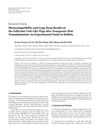 April 2011 in “ISRN Dermatology (Print)”
April 2011 in “ISRN Dermatology (Print)” The wigs made from human hair and polypropylene were mostly well-tolerated and durable in rabbits, suggesting they could be a new option for people with extensive hair loss.
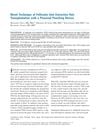 16 citations,
October 2008 in “Dermatologic Surgery”
16 citations,
October 2008 in “Dermatologic Surgery” The new powered hair transplant method is faster and damages fewer hairs than the manual method.
 11 citations,
May 2019 in “BioMed Research International”
11 citations,
May 2019 in “BioMed Research International” Hair transplantation effectively treats scalp scars with high success and patient satisfaction.
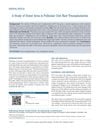 10 citations,
January 2013 in “Journal of Cutaneous and Aesthetic Surgery”
10 citations,
January 2013 in “Journal of Cutaneous and Aesthetic Surgery” Narrower donor strips and special closure techniques in hair transplants lead to smaller scars and happier patients.
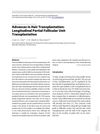 9 citations,
January 2015 in “Current problems in dermatology”
9 citations,
January 2015 in “Current problems in dermatology” New hair transplant method allows for hair regrowth in the donor area and less scarring.




























